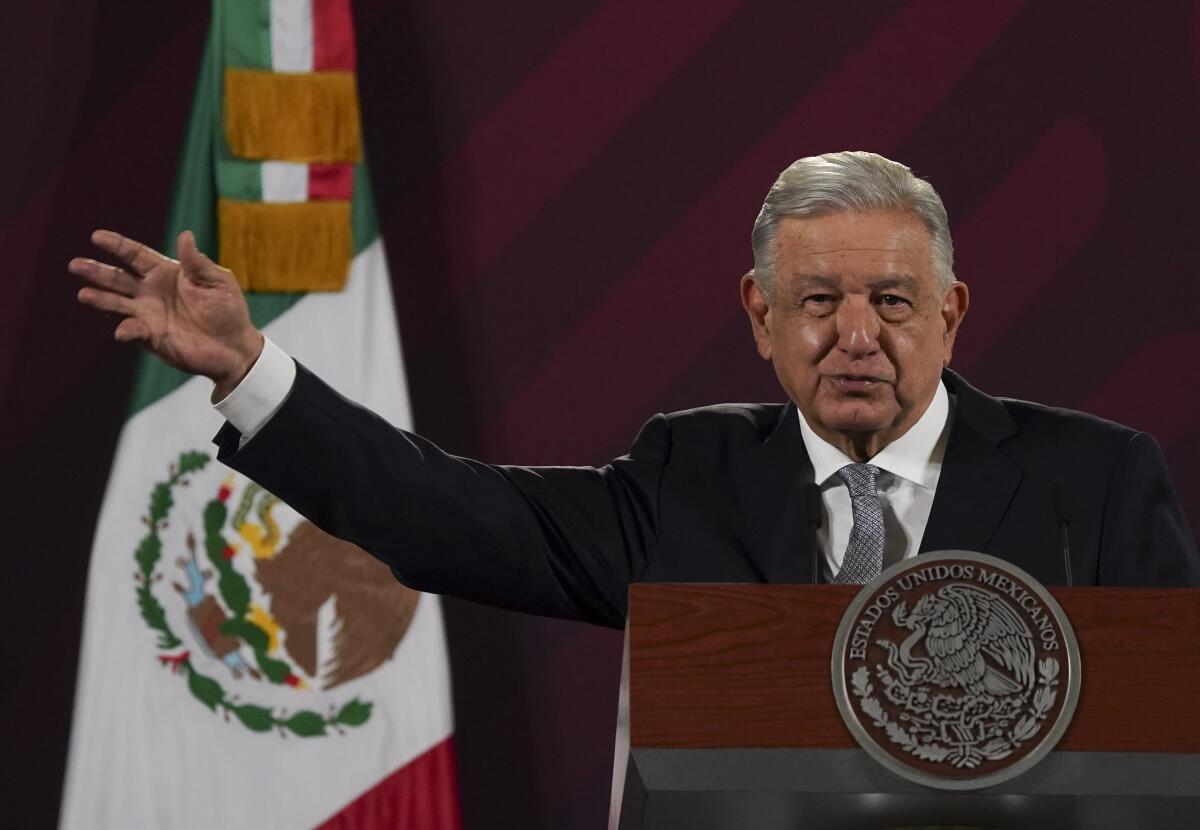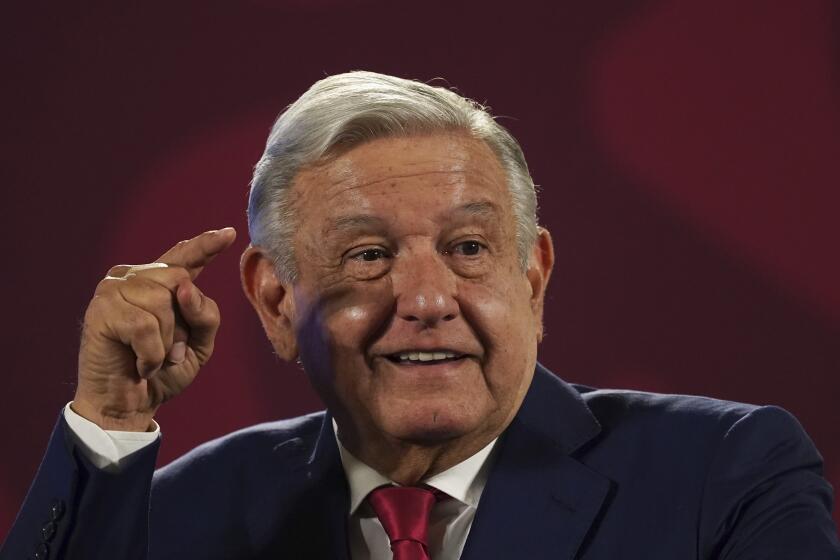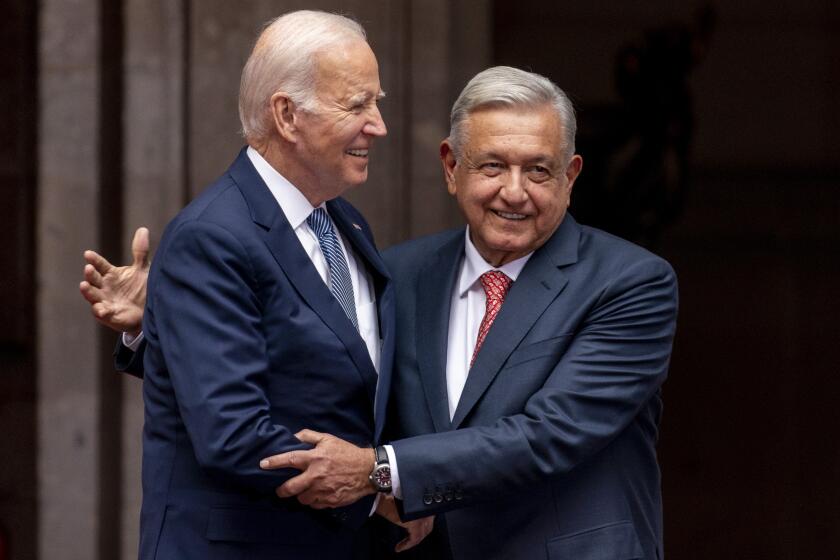Opinion: Why does Mexico’s president want to dismantle the democratic system that elected him?

- Share via
No president in modern Mexican history has enjoyed as much of a mandate as Andrés Manuel López Obrador. It is a shame he is so determined to invest it in a quest to dismantle the much-admired democratic institution that made his election possible in the first place.
Since the landslide election in 2018 that swept the populist former mayor of Mexico City and his Morena opposition movement into power, “AMLO” has sought to take his country back into the 20th century, back to the heyday of a highly centralized system with an omnipotent presidency at its pinnacle. Back, in other words, to a Mexico that looks very much like the authoritarian country the Institutional Revolutionary Party, known as the PRI, ruled for seven decades, with López Obrador and his “Fourth Transformation” disciples adopting the role of the old PRI establishment.
López Obrador spent his formative political years in the bosom of the PRI, from which he broke away to become a leading opposition figure on the left. After the PRI lost its monopolistic hold on the presidency in 2000, he lost a close presidential election in 2006 and a not-so-close race in 2012, before finally prevailing in 2018.
Mexico’s president dismisses the tens of thousands who demonstrated against his proposed electoral reforms as people who favor privilege and racism.
Mexico’s democratization over the past decades, the reason López Obrador was ever able to move into the National Palace and enjoy the legitimacy and mandate he does, is the result of a set of political reforms in the 1990s that created one of the world’s most sophisticated independent election authorities, now known as the National Electoral Institute (INE).
It is hard for an American to grasp what all the INE does, because as a society we have never had to design a federal body from scratch to insulate and protect every stage of an electoral process from the interference and manipulation of government authorities. Democratic processes in the U.S. have relied more on a culture of civic trust and a strong rule of law. Sadly, this may be changing, and we might soon need to invest in an INE of our own.
Mexicans, against a backdrop of zero trust, a history of vote rigging and a weak rule of law, had to build themselves a formidable elections agency to guarantee their democracy, much in the same way some countries are forced to invest heavily in formidable militaries to guarantee their survival.
The INE is charged with maintaining accurate nationwide voter registration rolls and providing foolproof, universal voter ID cards that empower rather than disenfranchise citizens. Its specialized civil servants, the National Electoral Professional Service, are charged with impartially organizing balloting in federal and local elections across a country of 130 million people and with counting the votes. In addition, the INE trains and deploys citizen poll workers chosen at random, much like we select courtroom juries in the U.S.
The INE also administers the country’s generous public financing of political parties; enforces strict campaign fundraising and expenditure rules, including the misuse of public resources and the misappropriation of media; and its specialized tribunals adjudicate electoral disputes.
The INE isn’t perfect, but it is widely considered the most efficient and credible public authority Mexicans interact with in their daily lives, and it is studied and emulated by fledgling democracies around the world.
The three North American presidents met in Mexico City this week, pledging increased cooperation on heightened migration in the region, energy policies and trade disputes.
Proof of Mexicans’ pride in their INE came last Sunday, when hundreds of thousands if not millions of people across the country marched to protest López Obrador’s assault on the agency and to ask the nation’s Supreme Court to block the president’s overreach.
AMLO, a prime beneficiary of the INE’s achievements, has built his movement with public resources and won elections that the agency ensured were clean and fair. But now in power, he is allergic to what the INE represents: independence and technocratic expertise, both of which he finds especially suspicious in public entities (he has relied increasingly on the military to govern). Moreover, he seems to view the INE with suspicion because it certified his narrow 2006 loss, which he has always refused to accept.
After failing to advance a constitutional amendment to disempower the INE, AMLO’s Morena party was able to pass a disingenuous “Plan B” law in the Mexican Congress that would starve it of the resources it needs to carry out its mission. He claims this is merely an austerity measure meant to curtail the privileges of overpaid bureaucrats who make Mexico’s democracy the priciest in the world. The INE’s annual budget for 2023, prior to the legislation that would dismantle much of its civil service and cede many of its functions back to the parties and temporary workers, was set at $765 million, or roughly 0.2% of Mexico’s federal budget.
For Mexicans who don’t want to return to a time when presidents could choose their own successor, the INE’s budget is a great bargain. Under the Mexican Constitution, López Obrador is limited to a single six-year term and cannot run for reelection. But crippling the INE before next year’s presidential election could give AMLO’s forces control over that outcome.
The fate of Mexico’s elections body is now in the hands of the nation’s Supreme Court, another public entity whose independence — not coincidentally — López Obrador has also deeply resented.
Andrés Martinez is a professor at Arizona State University’s Cronkite School of Journalism and Mass Communication.
More to Read
A cure for the common opinion
Get thought-provoking perspectives with our weekly newsletter.
You may occasionally receive promotional content from the Los Angeles Times.












